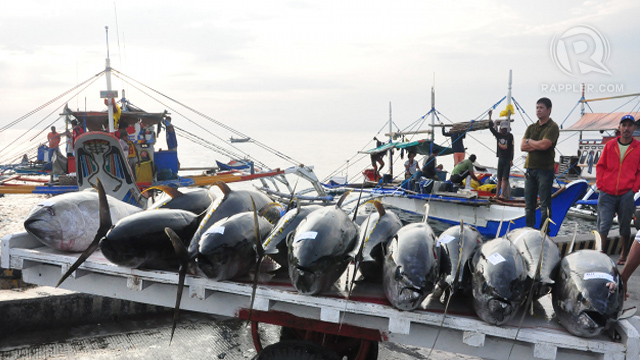SUMMARY
This is AI generated summarization, which may have errors. For context, always refer to the full article.

MANILA, Philippines (UPDATED) – Asia-Pacific fishing experts Sunday, December 3, warned against depleting tuna stocks, saying the region needs to reduce its catch of the vulnerable bigeye species by 30%.
Participants at the Manila conference of the Western and Central Pacific Fisheries Commission (WCPFC) said action must be taken not only to preserve tuna resources but also other marine life that are accidentally caught with them.
Some tuna varieties are overfished while others are near their limits, participants at the meeting said. Additionally, tuna fishers often catch sharks, rays and other fish in their nets, depleting their numbers as well.
The area covered by the WCPFC provides more than 50% of all the tuna catch in the world, said Asis Perez, head of the Philippine Bureau of Fisheries.
The commission, which groups over 30 countries and territories ranging from the United States, China and Australia to small Pacific island nations, has a special role in protecting tuna, he added.
Because tuna is a migratory species that moves from one country’s territory to another, cooperation is crucial to sustaining the resource.
WCPFC executive director Glenn Hurry said bigeye tuna, one of the most caught species, was reaching its limits and measures must be taken to limit the catching of this species.
“This is the one we’re worried about. The catch is too big. We need to find a way to reduce that,” he told reporters.
Conservation measure
Hurry said the region was producing about 151,000 tonnes of bigeye tuna annually which was too high.
“We need to reduce that catch by 30%,” he said.
But the catching of the other popular varieties like skipjack, yellowfin and Pacific albacore — should not increase either, Hurry warned.
Skipjack tuna catch was about 1.4 million tonnes last year, while yellowfin tuna catch was at about 550,000 tonnes in 2010, Hurry said, adding it should ideally be at 450,000 tonnes a year.
“We want to develop a conservation measure for the catching of bigeye, yellowfin and skipjack tuna,” he said.
Among the proposed measures is extending controls on “fish aggregating devices”– floating objects which attract fish in the high seas, making it easier for fishing boats to haul them in.
Such devices often result in the catching of immature tuna as well as other species like sharks, rays and sea turtles, participants said.
Fishing ban
The 5-day meeting will also review the ongoing ban on tuna fishing in “4 pockets of high seas “in the Western Pacific region and possible replacement measures.
In 2008, the 25-country fisheries commission imposed a limited ban on tuna fishing beginning that year after a steady decline on tuna catch record raised alarms in the highly lucrative and competitive world tuna fishing industry.
The Philippines is a signatory to the Commission.
In 2009, the WCPFC expanded its conservation measure that included a two-year closure of 4 pockets of high seas in the Pacific Ocean that lie in the path of the highly-migratory tuna and tuna-like species.
The ban took effect the following year but was extended during the belated March 2012 meeting of the Commission.
The WCPFC however granted Philippine tuna fishing vessels exclusive privilege to resume fishing in Pocket 1 after a strong lobby from the Philippine delegation led by Mindanao Development Authority Lualhati Antonino and Bureau of Fisheries and Aquatic Resources director Asis Perez at its Guam early this year.
Pocket 1 is an area of about 590,000 square kilometers north of Papua New Guinea and east of southern Indonesia.
The exemption however is limited to 36 Filipino fishing fleets with gross tonnage not exceeding 250 tons of traditional fresh/ice chilled catching vessels.
Only 8 of 36 fishing that were allowed to fish in the area have set sail to the area.
A source from the Philippine tuna industry based in General Santos City said the rest are eagerly awaiting the result of this week’s WCPFC meeting and see if the Philippines will keep its exempt status.
Philippines: key tuna source
The Philippines is one of the world’s leading tuna catchers as well as producers of canned and processed tuna products.
General Santos City, the country’s acknowledged tuna capital, is home to 6 of the Philippine’s tuna canning plant.
The tuna industry in General Santos City is generating more than US$250 million in export revenues making in the single biggest source of employment and livelihood in the said southern port city.
Industry sources said more than 120,000 residents are directly and indirectly dependent on tuna production.
The WCPFC meeting draws delegates from the Commission’s member countries that also include Australia, China, Canada, Cook Islands, European Union, Federated States of Micronesia, Fiji, France, Japan, Kiribati, Republic of Korea, Republic of Marshall Islands, Nauru, New Zealand, Niue, Palau, Papua New Guinea, Samoa, Solomon Islands, Chinese Taipei, Tonga, Tuvalu, United States of America, Vanuatu.
Aside from its member countries, the WCPFC also includes participating territories from American Samoa, Commonwealth of the Northern Mariana Islands, French Polynesia, Guam, New Caledonia, Tokelau, Wallis and Futuna.
The Commission also has Belize, Democratic People’s Republic of Korea, Ecuador, El Salvador, Indonesia, Mexico, Senegal, St Kitts and Nevis, Panama, Thailand, and Vietnam as cooperating non-member countries. – Rappler, with reports from Edwin Espejo and Agence France-Presse
Add a comment
How does this make you feel?
There are no comments yet. Add your comment to start the conversation.